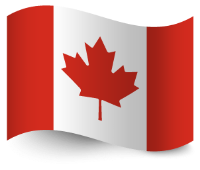As you are probably already aware, here at Herstat, we use Propolis ACF in our cold sore treatment. And, propolis is made by bees. As I was putting my Herstat LipCare stick on this cold morning, I thought to myself, "I wonder what the Canadian bees are doing right now?"
In the run up to Christmas, many cold sore sufferers will be hoping against hope that they can stave off the dreaded tingle which signals the start of an outbreak (this is where the Herstat LipCare stick can be invaluable), but do they ever spare a thought for the wonderful bees that make Herstat possible?
Well, if you have ever worried that the tiny winged creatures may be trying to fly through the icy winds of a Canadian winter, you can rest assured that most bee species generally stop flying once the local temperature dips below 10 ° Centigrade (50 ° Fahrenheit).
 In Canada at the moment there's not many places reading above freezing, so I guess most of the bees will be tucked up in their hives, but is my romanticised vision of Apis winter behaviour accurate and just how do the bees survive as the temperature drops?
In Canada at the moment there's not many places reading above freezing, so I guess most of the bees will be tucked up in their hives, but is my romanticised vision of Apis winter behaviour accurate and just how do the bees survive as the temperature drops?
Well, apparently, the bees form what is known as a "winter cluster"; with the queen bee at the centre and the worker bees huddled around her. The workers then "shiver" by vibrating their flight muscles, but not flapping the wings, and rotate around the queen to keep the centre of the cluster at a balmy 26 ° C (80 ° F). As they shudder around the huddle each bee works its way from the outside into the centre and then back out - in this way all the bees have time at the warmest part of the hive.
The bees need energy to keep this winter dance going and studies have shown that a hive of clustering bees can consume almost 14 kg (30 lbs) of honey in a single winter. As they consume stores of honey the cluster will move around the hive to new reserves, but in the very coldest longest winters, and if not enough honey has been collected during the summer months, the bees can run out of energy to keep the cluster warm.
So, the bees work together to keep themselves alive during the wintertide - while I use their wonderful propolis, and its antioxidant properties, to help keep my cold sores at bay and my lips protected from winter chill and the harmful effects of UV-A and UV-B rays.
Thank you bees! Happy Christmas.












